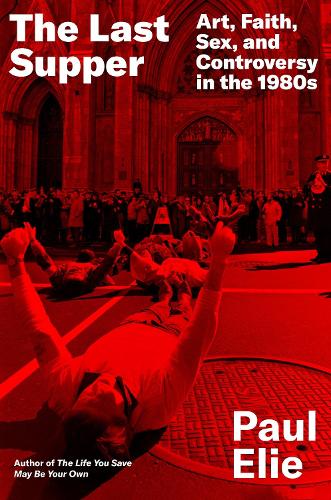
The Last Supper: Art, Faith, Sex, and Controversy in the 1980s
(Hardback)
Publishing Details
The Last Supper: Art, Faith, Sex, and Controversy in the 1980s
By (Author) Paul Elie
Farrar, Straus & Giroux Inc
Farrar, Straus & Giroux Inc
26th August 2025
16th June 2025
United States
Classifications
General
Non Fiction
Cultural studies
306.09048
Physical Properties
Hardback
496
Width 152mm, Height 229mm
685g
Description
This enthralling group portrait brings to life a moment when popular culture became the site of religious strife-strife that set the stage for some of the most salient political and cultural clashes of our day. Circa 1980, tradition and authority are in the ascendant, both in Catholicism (via Pope John Paul II) and in American civic life (through the Moral Majority and the so-called televangelists). But the public is deeply divided on issues of body and soul, devotion and desire. Enter the figures Paul Elie calls "cryptoreligious." Here is Leonard Cohen writing "Hallelujah" on his knees in a Times Square hotel room; Andy Warhol adapting Leonardo's The Last Supper in response to the AIDS pandemic; Prince making the cross and altar into "signs o' the times." Through Toni Morrison, spirits speak from the grave; Patti Smith and Bruce Springsteen deepen the tent-revival intensity of their work; Wim Wenders offers an angel's-eye view of Berlin; U2, the Neville Brothers, and Sinad O'Connor reckon with their Christian roots in music of mystic yearning. And Martin Scorsese overcomes fundamentalist ire to make The Last Temptation of Christ-a struggle that anticipates Salman Rushdie's struggle with Islam in The Satanic Verses. In Elie's acclaimed first book, The Life You Save May Be Your Own, Catholic writers ventured out into the wilds of postwar America; in this book, creative figures who were raised religious go to the margins of conventional belief, calling forth controversy. Episodes such as the boycott sparked by Madonna's "Like a Prayer" video and the tearing-up of Andres Serrano's Piss Christ in Congress are early skirmishes in the culture wars-but here the creators (not the politicians) are the protagonists, and the work they make speaks to conflicts that remain unsettled. The Last Supper explores the bold and unexpected forms an encounter with belief can take. It traces the beginnings of our postsecular age, in which religion is at once surging and in decline. Through a propulsive narrative, it reveals the crypto-religious imagination as complex, credible, daring, and vividly recognizable.
Reviews
"Elie's synthesis of the era is virtuosic and revelatory. And his mini-narratives are set pieces, laid out with such intricate detail that the book, at times, feels as finely chiseled as a work carved from Carrara marble."--David Friend, Vanity Fair
"Elie seeks to understand the ways in which religious ideals find expression in literature, arts, music, and culture . . . Readers may not always agree with Elie's contentions in this fascinating, well-written book, but they will never be bored." --Library Journal (starred review)
"Paul Elie's exhilarating and provocative meditation, The Last Supper, gathers together a disparate set of characters from the radical left to the radical right: politicians, philosophers, poets, filmmakers, visual artists, authors, but mostly musicians. What binds them in his telling is not simply a decade--the 1980s--or their work, notoriety, and genius; it is religion. Elie's revelation concerning the role of religion in modern life is as important as it is novel. Important because in an age of confusion, it provides answers. Novel because he introduces us to the corners of pop culture where God exists hidden in plain sight." --Mary Gabriel, author of Madonna: A Rebel Life
"Paul Elie has put together a creative jigsaw of the 1980s. Witten with clarity and grace and style, the pieces of this cultural history interlock masterfully. If you began listening and learning and loving in the 80s, this is the book for you. Forget about grandeur, Elie reveals to us that the world is, in fact, charged with the grungeur of God." --Colum McCann, author of Let The Great World Spin and Twist
"Only Paul Elie could give us this groundbreaking recounting of the hidden Catholic impulses that animated some of the most popular and influential artists in the early 1980s--everyone from Madonna to Andy Warhol to Martin Scorsese. Elie's argument that many artists of that era were, in a sense, "crypto-Catholics" is successfully borne out through a careful (and fascinating) analysis of their work and a thoroughgoing (and enjoyable) immersion in that era of volcanic creativity and change. Beautifully written, artfully presented, carefully researched, always surprising--and frequently brilliant."--James Martin, SJ, author of The Jesuit Guide to (Almost) Everything
"The Last Supper is a brilliant and daring work of history, one that shows how sex, art, and faith merged to produce not just the crazy 1980s but also the crazy world we inhabit today. Paul Elie follows an unforgettable cast of characters--from Warhol to Madonna to Toni Morrison--out to shake up the world, in a book that's equally smart and entertaining." --Jonathan Eig, winner of the Pulitzer Prize for King: A Life
Author Bio
Paul Elie is the author of The Life You Save May Be Your Own and Reinventing Bach, both National Book Critics Circle Award finalists. He is a senior fellow at Georgetown University's Berkley Center for Religion, Peace, and World Affairs, and a regular contributor to The New Yorker. He lives in Brooklyn.
